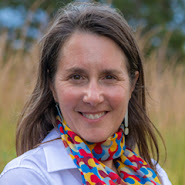 |
| Lisa Schulte Moore |
Lisa Schulte Moore, an
Iowa State University professor of natural resource ecology and management, has won a MacArthur Fellowship, sometimes called a "Genius grant." As a 2021 fellow, Schulte Moore will get $625,000 to spend as she pleases to further her study of sustainable agriculture. The
MacArthur Foundation website
says she'll use those funds to implement "locally relevant approaches to build soil, improve water quality, protect biodiversity, and strengthen the resilience of row-crop agriculture."
At Iowa State, Schulte Moore has "conducted groundbreaking research as a landscape ecologist working closely with farmers to build more sustainable and resilient agricultural systems," says an Iowa State press release. "She pushes the boundaries of her field by incorporating other disciplines traditionally thought of as beyond the scope of ecology – economics, engineering and sociology, for instance – to address critical challenges such as climate change, biodiversity loss, water quality and rural depopulation."
 |
| A prairie strip on an Iowa farm (Iowa State University photo) |
Much of her work addresses integrating native prairie plants into farms to improve production and conserve resources and species. She has been instrumental in the university's
Prairie STRIPS program, which aims to protect soil and water while providing narrow bands of habitat for prairie species. "She and her team's research have shown that strips of native prairie in agricultural fields can tremendously reduce soil loss and runoff of nitrogen and phosphorous by having more roots in the ground to hold soil and nutrients in place," Phillip Sitter
reports for the
Ames Tribune. "Prairie strips are now used on more than 115,000 acres of fields in 14 states, and the conservation practice has been federally recognized as eligible for government financial support by the 2018 Farm Bill."
Schulte Moore said, "I think of my work as putting together a puzzle, and I’m always looking for the missing puzzle piece. Where do I have to go or what do I have to learn to get the next piece? I’ve found that sometimes you have to build and paint the puzzle piece yourself, and that’s part of the fun of science."


No comments:
Post a Comment